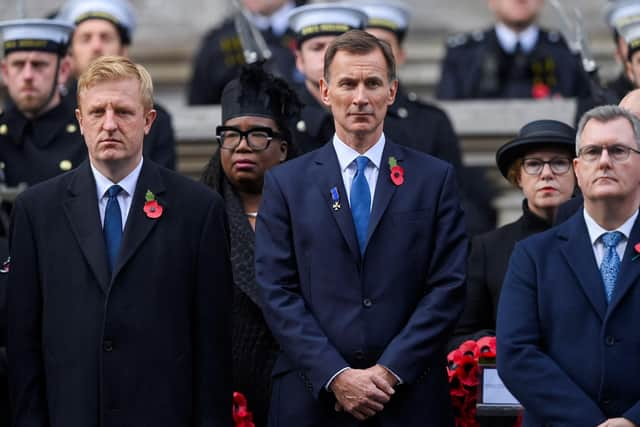Autumn statement: Jeremy Hunt says everyone will need to pay 'a bit more tax' after Thursday's budget
However, the Chancellor insisted it was “not just going to be bad news”, stressing he is keen to show the British people “the way through” the “difficult” circumstances at hand.
Mr Hunt has declared he will be playing Scrooge as he sets out his vision to restore financial “stability”, with a focus on delivering “certainty” to families and businesses in the wake of the market turmoil sparked by his predecessor’s £45 billion tax-cutting bonanza.
Advertisement
Hide AdAdvertisement
Hide AdHe has said “people with the broadest shoulders will bear the heaviest burden” as he seeks to fill a so-called black hole in the public finances. It is understood he is weighing up a cut to the threshold at which the highest earners start paying the top rate of tax, with a decision mooted for the level to be cut from £150,000 to £125,000 for taxpayers south of the border.


Mr Hunt acknowledged during a round of broadcast interviews on Sunday that everybody will see a greater burden going forward.
On who will be required to bear the brunt of the extra costs, he said the Government will be asking “everyone for sacrifices”, but said Britain was a “compassionate” country, insisting “there’s only so much you can ask from people on the very lowest incomes”.
Asked if he will therefore be paying more tax after next week, he told Sky’s Sophy Ridge on Sunday: “We’re all going to be paying a bit more tax, I’m afraid … but it’s not just going to be bad news.
“I think what people recognise is that if you want to give people confidence about the future, you have to be honest about the present. And you have to have a plan.
“This will be a plan to help bring down inflation, help control high energy prices and also get our way back to growing healthily, which is what we need so much.”
Mr Hunt said he would not be “hiding” any action he chooses to take on the economy when challenged over so-called stealth tax hikes.
The Chancellor is thought to be considering an extended freeze on income tax thresholds to raise extra revenue, which would push more people into higher tax brackets if their wages rise with inflation in an effect known as “fiscal drag”.
Advertisement
Hide AdAdvertisement
Hide AdIt comes after SNP Westminster leader Ian Blackford told Scotland on Sunday the Scottish public would support targeted tax rises. Deputy First Minister and acting finance secretary John Swinney has hinted tax rises could be coming for those north of the Border from April, with confirmation likely to come when the Scottish budget is published on December 15.
Mr Hunt would not be drawn on specific measures to feature in the autumn budget, but said the “principle” was the Government wanted to “give people confidence” on the plan for the economy.
He told Times Radio he wanted to make any potential recession as “painless” as possible, after GDP shrank by 0.2 per cent between July and September.
The Chancellor also confirmed he would announce the plan for energy bills from April in Thursday’s statement.
He told the BBC’s Sunday with Laura Kuenssberg that people will continue to receive support, but there will be “some constraints” to this.
“Will it be uncapped, unlimited? We have to recognise that one of the reasons for the instability that followed the mini-budget was that people were worried that we were exposing British public finances to the volatility of the international gas market,” he said. “So there has to be some constraints to it.
“But, yes, we will continue to support families and I will explain exactly how we’re going to do that.”
SNP shadow chancellor Alison Thewliss said: “The Chancellor should be preparing a budget that strengthens support to put money into people’s pockets and helps to properly tackle the Tory-made cost-of-living crisis - instead it's clear he is intent on ushering in a new era of Tory austerity by attempting to balance the books on the backs of some of the most vulnerable in society.
Advertisement
Hide AdAdvertisement
Hide Ad“The Chancellor must rethink and reject those plans and look to deliver real support as a bitter winter approaches for many, including protecting the pensions triple lock, raising benefits in line with inflation, expanding the windfall tax, and introducing a tax on share buybacks and scrapping the controversial non-dom status.”
Simon Clarke, who was secretary of state for levelling up, housing and communities during Liz Truss’s short tenure in No. 10, called for the books to be balanced through spending cuts rather than tax rises.
In an interview with the Sunday Times, he said the “tragedy” of Trussonomics was both the former PM and her chancellor, Kwasi Kwarteng, had the right idea about boosting growth. But he said it was a “mistake” to act without showing “we can pay our way as a country”, adding he will “put people ahead of ideology”.
The disastrous mini-budget may have cost the country as much as £30 billion, according to the Resolution Foundation, potentially doubling the task at hand for the Chancellor, as he seeks up to £60bn in savings and extra revenue.
The think-tank’s economists estimate Ms Truss and Mr Kwarteng blew £20bn on unfunded cuts to national insurance and stamp duty, with a further £10bn lost to higher interest rates and Government borrowing costs, the Observer reported.
Meanwhile, Labour has called on Mr Hunt to make “fair choices” in his autumn budget and not to put the whole burden on “ordinary working people”. Shadow chancellor Rachel Reeves warned public services are “on their knees”, insisting that “austerity 2.0” is not the right way forward.
Comments
Want to join the conversation? Please or to comment on this article.